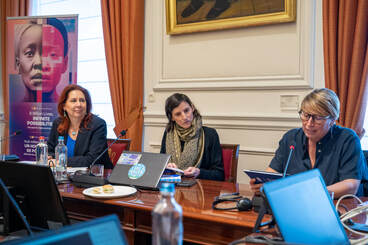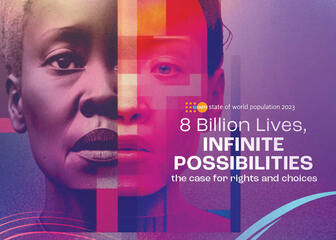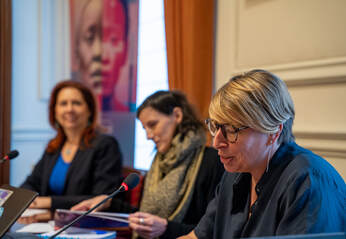
“We need to shatter the myths around population”. That is one of the core messages of UNFPA’s 2023 flagship State of the World Population report, presented on April 26th in the Belgian Senate to the ‘Parliamentarians for the 2030 Agenda’.
Overpopulation
One recurrent myth is that overpopulation drives climate change, concluding we need to reduce the number of children in countries with high fertility rates. Women in those countries however contribute the least to the global emissions and are most impacted by the consequences of climate change. Tackling climate change requires revising the production and consumption by countries that have the lowest fertility rates, but make up the world’s biggest polluters.
Low birth rates & Ageing
Low birth rates are not responsible for ageing populations. People are just living healthier and longer lives. We need to find answers by increasing productivity, increasing gender parity and understand that migration can be part of the solution, the report says. We should also support those who want to start a family, by investing in sexual and reproductive health care, childcare and quality education.
The question is choice, not population

According to the report, we need to be asking if everyone can make choices about their sexual and reproductive health. 44% of partnered women are unable to make their own decisions over health care, sex or contraception. The result is that nearly half of all pregnancies are unintended, abrogating women’s basic human right to decide freely and responsibly the number and spacing of their children.
Population concerns undermining women’s rights in the Balkan
Daniela Drandic of the International Confederation of Midwives explained the situation in Croatia, which is experiencing a spill-over in populist population fear rhetoric from Hungary and other Balkan countries. The country is faced with increased emigration to Western Europe, low birth rates and immigration. The demographic challenges faced in the country are blamed on women’s choice and sexual and reproductive health is being deprioritized and affected by the privatization of the health sector. What working parents need though is proper support to balance work and family life: high barriers to childcare exist, which makes parents doubt having more than one child.
Minister Gennez recognizes the opportunities and threats

Minister of Development Cooperation Caroline Gennez who attended the launch recognized the challenges to women’s rights and SRHR worldwide. She said “We should not surrender but keep the dialogue on universal human rights ongoing”. She reiterated Belgium’s dedication to SRHR and pointed out the importance of health systems strengthening and social protection. Building welfare states is what allows couples to choose to have children.
Read the SWOP 2023 report SWP Report 2023 | United Nations Population Fund (unfpa.org)
Read the SWOP 2023 report SWP Report 2023 | United Nations Population Fund (unfpa.org)

 RSS Feed
RSS Feed